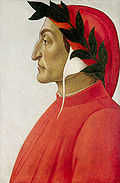- De vulgari eloquentia
-
De vulgari eloquentia (On Eloquence in the vernacular) is the title of an essay by Dante Alighieri, written in Latin and initially meant to consist of four books, but abandoned in the middle of the second. It was probably composed shortly after Dante went into exile; internal evidence points to a date between 1302 and 1305. The first book deals with the relationship between Latin and vernacular, and the search for an illustrious vernacular in the Italian area, while the second is an analysis of the structure of the "canto" or song (also spelled "canzone" in Italian), a literary genre.
Latin essays were very popular in the Middle Ages, but Dante made some innovations in his work: firstly the topic, which is the vernacular, was an uncommon choice at that time. Secondly, the way Dante approached this theme, that is giving to vernacular the same dignity that was only meant for Latin. Finally, Dante wrote this essay in order to analyse the origin and the philosophy of the vernacular, because, in his opinion, this language was not something static, but something that evolves and needed a historical contextualisation.
Contents
Structure
Dante interrupted his work at the fourteenth chapter of the second book, and though historians have tried to find a reason for this, it is still not known why Dante so abruptly aborted his essay. Indeed it is an unfinished project, and so information about its intended structure is limited. Though at some point, Dante mentions a fourth book in which he planned to deal with the comic genre and the "mediocre" style, nothing at all is known about the third book. It is thought, however, that the first book was meant to be a sort of preface to the following three books, and so shorter than the others.
Content
In the beginning, Dante tackles the historical evolution of language, which he thinks was born unitary and, at a later stage, was separated into different idioms because of the presumptuousness demonstrated by humankind at the time of the building of the Tower of Babel. He compiles a map of the geographical position of the languages he knows, dividing the European territory into three parts: one to the east, with the Greek languages; one to the north, with the Germanic languages; one to the south, separated into three Romance languages identified by the affirmation adverb: oc language, oïl language and sì language. He then discusses "gramatica" grammar, which is a static language consisting of unchanging rules, needed to make up for the natural languages. In chapters ten to fifteen of the first book, Dante writes about his search for the illustrious vernacular, among the fourteen varieties he claims to have found in the Italian region. In the second book, Dante deals with literary genres, specifying which are the ones that suit the vernacular.
Models
Dante takes inspiration from rhetorical essays in Latin, Occitan, and Italian, and from philosophical readings. The main classical rhetorical texts from which he drew information were the Ars Poetica by Horace, the Rhetorica ad Herennium by an anonymous author, and De Inventione by Cicero. About the philosophical works, it is important to know that Dante read not only first hand texts, but also summaries that sometimes were not of the original work, but of an intermediary one.
The major Occitan work that influenced Dante was probably Razos de trobar by the Catalan troubadour Raimon Vidal de Bezaudun and the Vers e regles de trobar, an amplification of Vidal's manual, by Jofre de Foixà.[1][2] Both of these works were Occitan manuals of grammar for troubadour poetry. They implicitly and explicitly defended Occitan as the best vernacular for song and verse, prompting Dante to come to the defence of his beloved Tuscan tongue. The popularity of both singing and composing in Occitan by Italians prompted Dante to write: A perpetuale infamia e depressione delli malvagi uomini d'Italia, che commendando lo volgare altrui, e li loro proprio dispregiano,[3] meaning "It is to the perpetual shame and sadness of the abominable Italians that they have taken command of another vernacular and despise their own."
Directly or indirectly, Dante came to read Saint Augustine's works, the De Consolatione Philosophiae by Boëthius, Saint Thomas Aquinas's works and some encyclopedic dictionaries like the Etymologiae by Isidore of Seville and the Livre du Tresor by Brunetto Latini. He takes also inspiration from Aristotelian philosophy, and in Dante's work are traceable some references to texts by representatives of what is sometimes referred to as Radical Aristotelianism.
Sources
- Graham-Leigh, Elaine. The Southern French Nobility and the Albigensian Crusade. Woodbridge: The Boydell Press, 2005. ISBN 1-84383-129-5
- Ewert, A. "Dante's Theory of Language." The Modern Language Review, Vol. 35, No. 3. (Jul., 1940), pp 355–366.
- Weiss, R. "Links between the "Convivio" and the 'De Vulgari Eloquentia'." The Modern Language Review, Vol. 37, No. 2. (Apr., 1942), pp 156–168.
- Dante Alighieri, "De vulgari eloquentia," edited and translated by Steven Botterill. Cambridge: Cambridge University Press, 1996.
Notes
External links
- [1] De vulgari eloquentia in Latin.
Dante Alighieri Works in Latin 
Works in Italian Divina Commedia Characters of
Divina CommediaAlichino · Barbariccia · Ciampolo · Cocytus · Corso Donati · Dis · Eunoe · Forese Donati · Malacoda · Malebranche · Malebolge · Piccarda · Satan · ScarmiglioneInsights In popular culture Dante and his Divine Comedy in popular culture · Après une Lecture de Dante: Fantasia quasi Sonata · Dante crater · Dante Park · The Divine Comedy (symphony) · Dante's Inferno (1924 film) · Dante's Inferno (1935 film) · Dante's Inferno (2007 film) · Dante's Inferno (video game) · Dante's Inferno: An Animated Epic · Dante Symphony · Demon Lord Dante · L'Inferno (film) · Italian battleship Dante AlighieriCategories:- 1300s books
- Italian literature
- Linguistics books
- Medieval literature
- Unfinished books
- History of linguistics
- Works by Dante Alighieri
Wikimedia Foundation. 2010.
